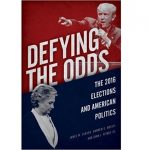The county-level electoral map is a familiar sight after each election—the spilled bucket of red paint, with little splotches of blue along the coasts and in metropolitan areas. Of course, a three-dimensional version of that map would show skyscrapers of blue looming over sparsely populated red counties.
Urban America and rural America have seemingly come apart, two peoples in a single nation. Progressives enjoy heavily concentrated support in cities and college towns, while support for conservatism is wide, broad, and rural—and increasingly, never the twain shall meet.
The modern conservative movement—the three-legged stool of economic, social, and national security conservatives who have steered Republican politics for decades—has had its traditional base in rural America.
But conservatism is not what won the 2016 election. In the primaries, Republican voters were willing to countenance and eventually to support a celebrity strongman. The general election was a war of attrition between two intensely disliked candidates, not to be confused with any defense, much less advancement, of conservatism writ large. Leaders in the traditional conservative movement now face the unsettling thought that they may be generals without an army.
Start your day with Public Discourse
Sign up and get our daily essays sent straight to your inbox.Mr. Trump goes to Washington with no evident ideological framework and no significant debts owed to any form of traditional conservativism. “Don’t forget,” he told an interviewer after securing the nomination. “This is called the Republican Party, it is not called the conservative party.”
The number of Rust Belt voters who powered President-elect Trump’s victory wouldn’t even fill Michigan Stadium. 77,744 votes swung Wisconsin, Michigan, and Pennsylvania from blue to red. The policies that garnered support there? A border wall, tariffs, “protecting” Medicare, infrastructure spending, an imperial view of the presidency, “culture war” agnosticism, and a rash of other conservative heterodoxies.
Friends of limited government will not find fertile ground in the fields of Trumpism, although the temptation to retrofit his supporters into the conservative movement will be irresistible for some. But a conservative movement that reforms itself around 2016’s decisive white working-class voters will have learned the wrong lessons from the Trump experiment.
With an overactive, overreaching, overly powerful government a fact of life in too many communities, conservatives should recommit themselves to building an agenda that speaks to the needs of individuals and families living in urban areas. Doubling down on small town voters would not only be a bad demographic bet, it would be failing the fifty-seven million Americans who live in densely populated urban areas, abandoning them to a never-ending parade of progressive county executives, mayors, and city councils.
Cities Especially Suffer When Government Replaces Civil Society
The Census Bureau counts seven out of every ten Americans living in metropolitan areas of 50,000 people or more. At the same time, out of our nation’s twenty-five largest cities, only San Diego, Jacksonville, and Fort Worth have Republican mayors. Outside of military communities or the deep heart of Texas, large city governance is a steady diet of progressivism.
A robust urban conservatism would be a powerful counterpoint to the left’s identity politics and aggressive progressivism. In some circles, the phrase “urban voters” connotes race. It shouldn’t. Both the professionals who live in million-dollar condos and the immigrant groups struggling to make ends meet often feel abandoned, in their own way, by ideologically pure, “starve-the-beast” forms of conservatism.
Conservatives must do the hard work of developing a better understanding of—and prescription for—the needs of the Latino parents who work in food service, the white couple living in public housing, the marketing executive who rides the bus to work, the elderly woman living alone, and the rest who make up the mosaic of modern city life. They are injured by oppressive regulation, ever-increasing costs of living, financially and ethically bankrupt city and county governments, heavy-handed insistence on liberal sexual orthodoxy, and the numerous other ways progressivism weakens families, harms the economy, and fractures society. They deserve another viable policy vision apart from a cradle-to-grave welfare state.
When social institutions such as marriage and work break down, families are left adrift, alone, and alienated. This cultural insecurity is surely a problem for the rural whites who supported Trump, but is even more of a problem for those in Chicago, Los Angeles, and Wilmington. As family breaks down and civil society wanes, what’s left? Just ask “Julia,” the infamous Obama campaign personage who relied on government at every stage of life.
If movement conservatism must be rebuilt—and Trump’s victory proves that it must—it should be done in a way that is relevant to all Americans. An unwillingness to invest in urban centers may once have been justified in the pursuit of a 50-percent-plus-one national strategy, but no longer. Our country is bifurcating into two nations under God, neatly divisible along lines of education and income, with one party increasingly representing each class.
What could the particulars of urban conservativism look like? Scholars such as Aaron Renn, Heather Mac Donald, and Oren Cass at the Manhattan Institute and Michael Strain at the American Enterprise Institute have been blazing trails in constructing policies relevant to urban voters. The New Urbanism project, housed at American Conservative magazine, has done pioneering work in highlighting conservative urban development. Other influences could be the libertarian-influenced Market Urbanism project, the nostalgia-free principles for reform conservatism offered by Yuval Levin in The Fractured Republic, a city-friendly variant on the “Sam’s Club Republicanism” put forth by Ross Douthat and Reihan Salam, or even a radical proposal such as Charles Murray’s suggested universal basic income.
While think tanks like the Manhattan Institute and AEI deserve praise for the work they’ve already done, this project needs to be taken up far outside the Acela corridor. For example, expanding social conservatives’ traditional pro-family platform to support making cities more livable and family-friendly could expand and diversify the movement’s appeal.
Prudence Takes Precedence in Rolling Back Welfare State
This approach cannot be the same policy formula under a different label. Urban conservativism would be forced to recognize and reduce the mutual dependence that has developed between city life and big government. Cutting the modern welfare state off at the roots is not a viable option. Its tendrils are now so firmly engrained in American urban life that a sudden hatchet blow would probably do more harm than good.
Imagine the amount of human turmoil and economic distress that would result if the Department of Housing and Urban Development were to be summarily dispensed with overnight. Slowly ratcheting back the level of excessive government involvement in a way that minimizes the disruption of families and communities entails knowing how to gradually manipulate the levers of government while being realistic about unintended consequences. In short, it requires a profoundly conservative approach to policymaking.
Some deride such an incremental approach as “me-too conservatism.” Refundable tax credits, supportive housing for at-risk families, or targeted mass transit spending are called different in scale, not in kind, from the basket of goodies progressives are eager to hand out. Shouldn’t conservatives be offering a strong alternative instead of a pale imitation?
Tinkering around the edges of public policy recently received a more philosophical critique in the back pages of First Things. Technocrats who would shape society through government are called “oblivious and cruel,” valuing only what can be measured and improved. “In an age of utility, everyone and everything becomes a tool.” From this point of view, trying to recover strong families and a healthy society through wage subsidies and healthcare vouchers is a category error, like trying to fix your car with a sonnet.
Candor compels me to admit my bias as a graduate student of public policy. I am sensitive to the charge of technocratic overreach, but a detailed policy agenda that knows its limits seems preferable to either the limitless self-regard of progressivism or a sudden return to 1890s levels of government intrusion. The overreach of the welfare state can’t be rolled back overnight. As a practical matter, the responsibilities it has assumed have crowded out many of the charitable organizations and other civic actors that used to be at the ready.
Yuval Levin, intellectual godfather of the “reform conservatism” movement, addresses this point in his most recent book. Conservatives, he says, should not fear to
enter into the details of public policy debates, and not limit themselves to the level of abstraction. Some conservatives recoil from such details, taking arguments about them to be concessions to the technocratic mindset they reject. But in fact, engaging in such debates is the only way to effectively transform our governing institutions.
Seeking to improve the workings of government does not require us to call government the name for the things we choose to do together. Ironically, this is a lesson that some progressives are already learning. The growth of good-government initiatives, such as the Mayor’s Office of New Urban Mechanics in Boston, illustrates their recognition that government by executive fiat may actually have some drawbacks. They are discovering a strange new respect for the principle that sometimes the government that governs best governs closest to the people it serves.
But conservatives should have the clear upper hand when it comes to rebuilding social capital. It’s not enough just to cut spending and watch cities heal themselves. In a pre-election essay for the Washington Free Beacon, Matthew Continetti counseled conservatives to “[permeate] the managerial society and gradually [direct] it in a prudential, reflective, virtuous manner respectful of both freedom and tradition.” This means playing to our strengths as conservatives, not being mere reactionaries. If a doctor must remove a cancerous lesion, a scalpel will be much more efficacious than a hatchet.
A robust urban conservativism, committed to rebuilding civil society, civic trust, and good governance, would be good for the country and good politics. One example of this was found in Florida, where Sen. Marco Rubio easily defended his Senate seat, even winning a majority-black district by being unafraid to critique predatory landlords in Jacksonville.
Identity politics and progressive handouts may be ingrained habits for some urban voters. But how many more have never heard a cogent application of conservative principles to the needs facing their family and community?
In 1965, Lyndon Baines Johnson launched the nation’s “War on Poverty.” That same year, William F. Buckley’s quixotic campaign for mayor of New York garnered 13 percent of the vote. America’s urban poor would be better off now if, during those fifty years, more conservative leaders had been willing to follow Buckley’s example in gamely proposing long-shot conservative solutions in cities—even in the heart of liberal Gotham.
You can’t win if you don’t show up, but you can’t show up if you don’t know how the game is played. The lesson we learned from 2016’s contest shouldn’t be misinterpreted: a slim margin of white working-class voters put a non-ideological businessman in the White House. Conservatives who seek to recreate that inside straight along the Rust Belt will find they’re always missing a trump card. A better future payoff requires a more sustainable strategy.
It’s time for the traditional conservative movement to prioritize bringing its principles to America’s cities. If we believe in the power of ideas, let’s compete on them, and when we win, govern best, not just govern least.














